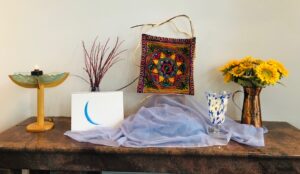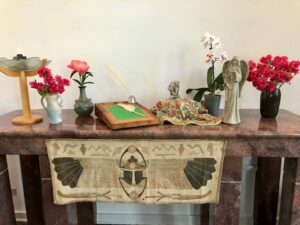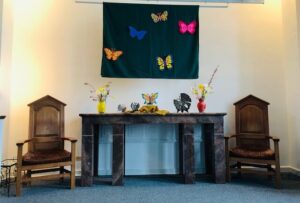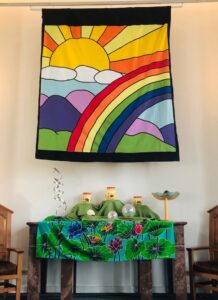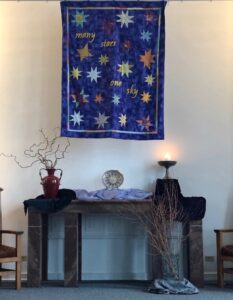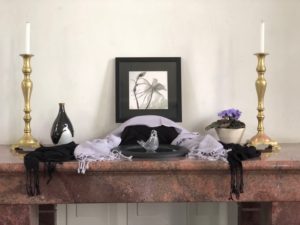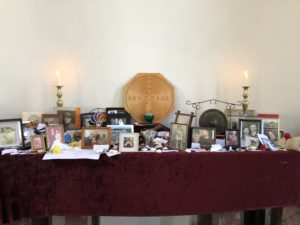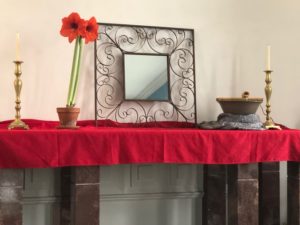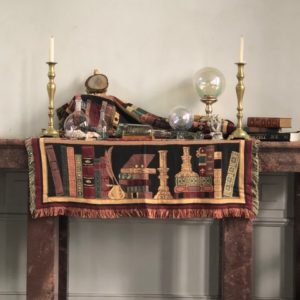The service was led by Rev. Alex McGee, Assistant Minister and Bob Gross, Worship Weaver.
This text and notes are generally what I said from the pulpit, but some extemporizing and changes occurred during delivery. Please give credit when citing sources.
For today, I picked the sermon title “What Does Love Ask of Me?”
As I reflected further, I think the question What Does Love Require of Me Today is even more specific and useful. It does not ask what the calendar requires; it does not ask what the budget requires; it does not ask what tradition or culture requires. It asks what Love requires. When something is required, it is necessary to the situation. The original sermon title, “What does love ask”, sounded more like a wish or a request—something optional.
By adding the word “Today” —What does Love require of me Today, there is also more necessity, more timeliness, more here and now. It does not ask what might be possible with more time, or more money or more courage. This gives a guide, indeed, for daily life.
In the Opening Reading, we heard from the author Courtney Martin, who shared about her experience of exploring a topic close to her heart: how to live her feminist ethics. In the process, she received feedback about how her language affected some people who live with disabilities. In the process of trying to take responsibility, she received more feedback about her process. In the end, she had learned about her own power, stepped into it, and felt a new sense of integrity. (See book: Mistakes I Made at Work edited by Jessica Bacal, Plume, 2014)
The sense of integrity came from a process of stepping back and reflecting. She widened her circle of concern. She summoned up courage. She allowed others to care for her as she struggled.
What I find so moving about this example is that she was already working for justice. She already had a sense of what was right. She knew that she had experienced being limited by social norms, and she was trying to speak up about it—that’s what feminism is. What was unnerving to her was that she had more to learn in an area where her ideals had led her to speak as an expert. What is inspiring to me is that she stepped up to the plate and learned and shifted her actions.
So, we might imagine that she had to do what Love Required of her on that Day.
Living with this question as a daily guide clearly involves effort and challenge. But it also has rewards. Part of the reward is a sense of clarity about what voices to listen to—internal and external voices.
Here is another example:
Last month, on June 15th in Richmond there was a gathering of the Virginia Democratic Party. It was a political event. It was a fundraiser in which current elected officials and candidate hopefuls gave talks. As one might imagine, the speakers asked for justice and to do what is right. They suggested strategies and action. They used oratory skills and dressed sharp.
But after the event was over, who got the rave reviews?
Whose talk was widely requested and clipped out of the long video to be passed around on the internet?
The rabbi. Yes, there was a rabbi – he wasn’t there as a candidate or even as a main speaker. He had been invited to give the prayer before the meal. invited to give the invocation—because, it is not uncommon to have a prayer before a meal at a gathering, and at political functions, sometimes local faith leaders are asked to come and fill this role. this formal gathering they invited a rabbi to come and speak. It was a five minute prayer. The room was still. People listened. He wasn’t even talking to them. He was talking to “Sovereign of Space and Time.” Yes, that is how he started out his prayer, how he addressed the Sacred. Midway through the prayer, he again addressed the Sacred, this time speaking to the “Source of Love and Light,” if I remember correctly from the video. (Source: https://www.c-span.org/video/?c4806907/bcg-19-prayer)
The reason I tell you this story is because his motivation that day was solely to speak with Love to the Source of Love. And it got people’s attention. But he wasn’t even trying to steal the show. It just happened that way.
This is a universal truth. Throughout history, people have discovered that doing something in a rote or mechanical way has one quality, while it has a different quality if it is infused with love.
Maybe you can relate—trying to get the kids out to the door to school, trying to wait in line at the store and speak to the clerk; trying to do committee work here at this congregation. Each can be done solely as a task to be completed, or it can be infused with love.
I have that experience on Sunday mornings when I need to set up the projector, plan with the other worship leader, say hello to the people arriving. I aspire to do it with Love, but I probably only access that Love about 75% of the time, … and I hope that the other 25% of the time, Love grabs hold of me and guides me.
This is such a universal experience that it has been written about for eons. When I was a child in the Presbyterian Church I learned a verse that has made more and more sense to me as I have gotten older.
It comes back to me again and again is the one that basically says: Religious acts don’t matter…..unless they are done with love.
The verse comes from a part of the Bible in which new young Christian communities are starting up. One of the leaders shares his personal experience about doing the religious rituals. He describes the speaking in tongues, prophecy, faith, mysteries and knowledge—these are all familiar in that setting. But he gives a caveat. Here is what he said: “If I speak in the tongues of mortals and of angels, but do not have love, I am a noisy gong or a clanging cymbal. And if I have prophetic powers, and understand all the mysteries and all knowledge, and if I have all faith, so as to remove mountains, but do not have love, I am nothing. If I give away all my possessions, and if I hand over my body so that I am boast, but do not have love, I gain nothing.”
So he is saying, on the surface a person my be doing the right act, but it only has value if it is guided within by Love. Love can show what is worthy of our time and attention. Perhaps it is like a child who receives gifts at a holiday, and the shiny ones go untouched, while the one gift that gives them the joy and care is the one they notice.
This principle applies more widely, because being in a faith community is not just the rituals. It is also all the other logistics and meetings and hallway conversations.
Sometimes there are hard things that need to be said. When I face a situation where I feel like I need to say something, and I’m not sure how to say it, sometimes I try to think hard about what workshops I’ve taken on communication, or what skills I learned on how to have hard conversations. But that could accidentally be the noisy gong or clanging cymbal. But underneath all of the communication methods, what I know is that if I don’t have a sense of honest caring inside myself, trying to have a difficult conversation with someone else is not going to work at all. If I can access that love, then at least there’s some hope.
I’ve been thinking about the Covenant that this church voted on and agreed to nine years ago. The only line that seems to be controversial is the line about calling each other lovingly back into Covenant. I’ve been wondering why we didn’t add the word “ourselves” in there. What about calling ourselves back into Covenant? Instead of waiting for someone else to ask that of us? If we go by the question, What Does Love Require of Me Today, we might find ourselves voluntarily making amends.
This wisdom of voluntarily making amends is well known in long term happy marriages—people have learned to dig deep for the Love and apologize.
Which leads back to the questions: How do we know what is right to do in any given situation? Where can we look for prescriptions of the best action? How can one develop this habit?
One way that is well known for developing a daily habit…
Oprah became widely acknowledged for suggesting that people keep a gratitude journal.
What if one turned their focus, using this same tool to focus on something equally important: how was I guided by love today? We learn by looking back at our successes. We develop habits by recording behaviors. We cultivate awareness by naming what might go unseen.
The rewards of doing this are that life is richer, living in line with highest aspirations, and each moment is a gift to oneself and others. I think those are pretty great rewards.
Here is a second way: In the Buddhist tradition, there is a practice called Loving Kindness. It is a meditation practice in which a person cultivates a sense of warmth and well wishes toward others. It is not easy. It is not easy to sit still and stay focused, for starters, but the practice intentionally challenges a person to wish for happiness not only for those they easily like, but also those who rub them the wrong way. The teacher Pema Chodron says: “The main point of doing this practice is to uncover the ability to love without bias. Making the aspirations is like watering the seed of goodwill so it can begin to grow. Everything we encounter becomes an opportunity for practicing loving-kindness.” (The Places that Scare You, page 46-47.)
These spiritual practices apply to our lives.
Humans have to face tough situations, and figure out what to do.
Humans face aching questions, but these questions are usually not unique.
Humans can look to history for lessons, can look to religion for answers, but perhaps the greatest wisdom comes from pausing, reflecting, and asking What Does Love Require of Me Today?
Here is what I know about where we stand today in our world.
We are again in a season of the year in which hurricanes are battering the coast.
We are again in a season in which Charlottesville remembers the violence from August 2017.
We are again in a season that happens every four years in this country in which candidates are debating one another.
We are again in a season in history in which a certain group of people is being held in detention camps.
What shall we do? What will you do?
You have not come to a house of worship where rules or ritual tell you what to do. But you can be guided by something greater and deeper than yourself alone.
And that is good news.
Please join me in a moment of silence.
—
Closing Words were from Mia Mingus blogpost Dreaming Accountability: “What if accountability wasn’t scary? It will never be easy or comfortable, but what if it wasn’t scary? What if our own accountability wasn’t something we ran from, but something we ran towards and desired, appreciated, held as sacred? What if we cherished opportunities to take accountability as precious opportunities to practice liberation? To practice love? To practice the kinds of people, elders-to-be, and souls we want to be? To practice that which we can only practice in real time?”
—
Please give credit when citing sources.

